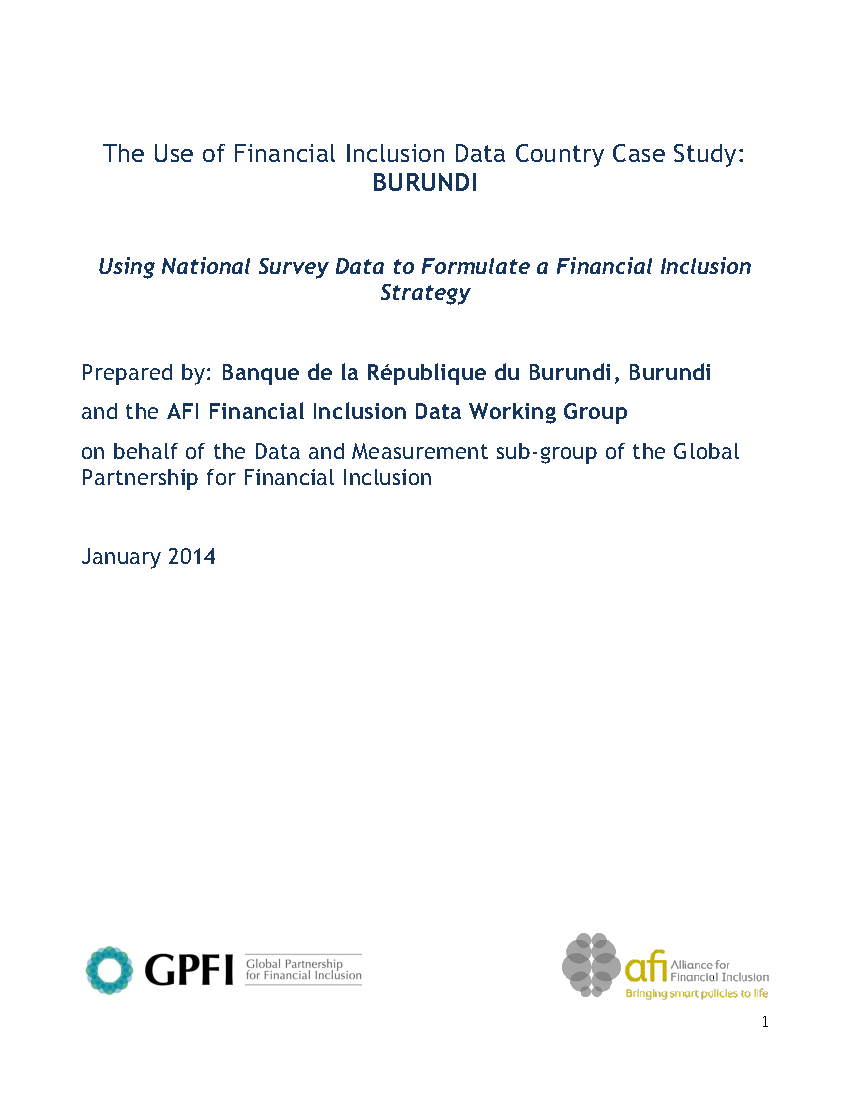The Use of Financial Inclusion Data: Country Case Study of Burundi
Using National Survey Data to Formulate a Financial Inclusion Strategy
Prepared by: Bank of the Republic of Burundi (BRB) and the Alliance for Financial Inclusion (AFI) Financial Inclusion Data Working Group (FIDWG) on behalf of the Data and Measurement sub-group of the Global Partnership for Financial Inclusion (GPFI).
The Bank of the Republic of Burundi (BRB) realized that they couldn’t develop effective financial inclusion policies without reliable data on access, usage and quality of financial services in the country. To this end and with support from AFI, they undertook a national demand-side survey to diagnose the state of financial inclusion. The study describes the multi-stakeholder approach, involving both the public and private sector and gives a summary of the findings. The findings enabled policy makers to identify barriers and areas of focus for financial inclusion, leading to the development a national strategy. The data also enabled policymakers to set national financial inclusion targets.
Introductory Note to Case Studies on the Use of Financial Inclusion Data
The GPFI has recognized the importance of reliable data on which to base informed financial inclusion policies and interventions since its inception. The Data and Measurement sub-group gave substance to this by providing a framework for data collection, encapsulated in the initial G20 Basic Set of financial inclusion indicators, subsequently expanded to the more holistic G20 Financial Inclusion Indicators. These indicators capture the financial inclusion dimensions of access, usage and quality of service provisioning, both for individuals and for small enterprises. Using existing data to populate the indicators has provided a solid basis for countries to assess the state of financial inclusion and focus national data collection efforts.
The objective of driving financial inclusion forward has resulted in a focus on financial inclusion targets, at both global and national levels. As indicators of financial inclusion are crucial to an informed approach to targets (and policy formulation in general), the Data and Measurement sub-group developed an approach to target setting based on financial inclusion archetypes and a note on global and national targets and what each of these should focus on. During this work it became apparent that there is neither a single approach to policy formulation and target setting that is applicable to all countries nor an ideal model that all countries can benchmark themselves against and set policies and targets accordingly. Each country is unique, with a specific set of circumstances, priorities and capabilities to deal with in the national policy framework of the country. The golden thread linking successful policy interventions would appear to be the use of the indicators, supplemented with relevant data on specific issues or areas of focus, informing financial inclusion policy makers on actions, policies and targets.
Click here to access the entire Introductory Note

 About
About
 Online
Online
 Data
Data




















